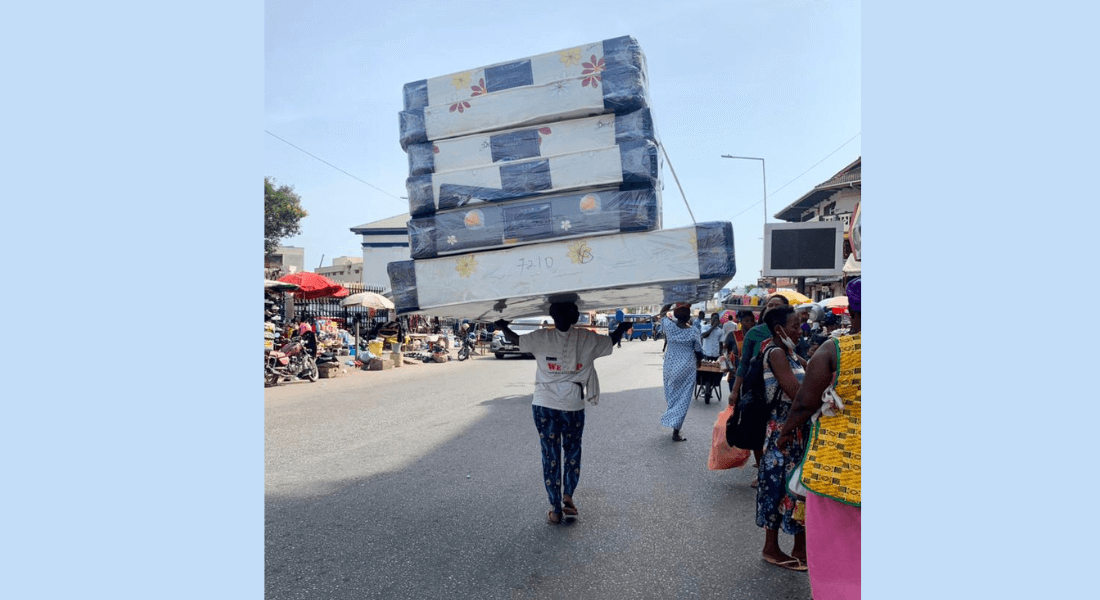Master Thesis Presentation: Gifty Louisa Cobbinah
Gifty Louisa Cobbinah, CERTIZENS member and recent master's graduate at the Institute of African Studies, University of Ghana, presents her thesis on 'Digitisation and Certification in the Informal Sector: Case Study of Head Porters in Ghana'.

Digitisation and Certification in the Informal Sector: Case Study of Head Porters in Ghana
What is your research question and where and how did you go about doing your research?
My thesis research examines the impact of citizen registration in Ghana on the lives of female head porters who work in the Accra Central markets, focusing on how this affects their access to and use of mobile phones for financial transactions. The study examines the savings culture of these young women – mostly migrants from Northern Ghana – and how access to the Ghana Card, or not, impacts their use of both informal savings and formal savings institutions.
The study was carried out using qualitative and ethnographic research methods in the Accra Metropolis, specifically in the Central Markets around Makola, Cocoa Marketing Board (CMB), Tudu, and Agbogbloshie (Konkomba). While the target population for this study were young women head porters, primary data was collected from head porters, susu collectors (individuals who provide an opportunity for informal sector workers to save money on a daily basis), mobile money operators, and one government official from the National Commission for Civic Education (NCCE). This latter government agency is in charge of educating citizens on government policies in Ghana. Semi-structured interviews and participant observations were used. In addition, a survey with closed-ended questions was administered to head porters to get a quantitative representation of their activities and experiences with ID registration, mobile phones and savings.
What were your key findings and why do they matter?
The findings suggest that head porters face significant barriers in accessing the Ghana Card due to state discrimination. Their experiences with the Ghana Card registration process highlight a serious weakness in the implementation of certain public policies, especially in terms of how they impact marginalised groups. The Ghana Card was either unknown or inaccessible to a significant number of head porters depending on their circumstances. Evidence from the field revealed that head porters who come from remote areas had no information about the registration process so they did not register. The dispersed nature of settlements in Northern Ghana posed a challenge to the NCCE officials as they were unable to get to some villages and educate the indigenes on the Ghana Card registration. Network problems and lack of electricity also made it difficult to reach certain villages. Consequently, many head porters remain unaware or are unable to register for the Ghana Card, which is crucial for accessing essential services such as savings and formalising their identity. The study also highlights how head porters’ sense of citizenship and belonging is therefore threatened by their exclusion from official identification procedures, which also restricts their access to saving at the bank and using mobile money. This is leading to disenfranchisement by a state that claims to be including marginalized citizens, which then keeps them in poverty.
Why is your research relevant for the broader discussion on IDs and citizenship in Africa?
The path to achieving fair access to legal identity necessitates a determined effort to foster trust, remove structural obstacles, and guarantee that all people, regardless of their socioeconomic background or location, can engage fully in society. My research underlines the ways in which instead of being a means of inclusion and empowerment, the Ghana Card in some contexts is deepening forms of exclusion. In-depth empirical research points to the need for the government and other relevant stakeholders to adopt an endogenous approach to policy which involves exposure and openness to the lives of diverse citizens, and community involvement to streamline the registration procedures. In addition to empowering head porters and other informal sector workers, this strategy will help achieve the Sustainable Development Goals (SDGs), especially those on social inclusion and legal identity.
To access the full thesis, please contact the author via louisita14@gmail.com.
